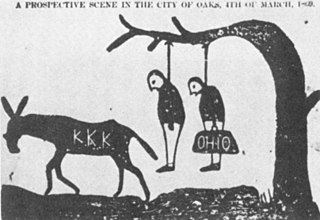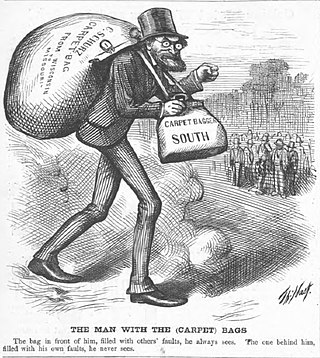Related Research Articles

The Fifteenth Amendment to the United States Constitution prohibits the federal government and each state from denying or abridging a citizen's right to vote "on account of race, color, or previous condition of servitude." It was ratified on February 3, 1870, as the third and last of the Reconstruction Amendments.

The Reconstruction era was a period in United States history following the American Civil War, dominated by the legal, social, and political challenges of abolishing slavery and reintegrating the former Confederate States of America into the United States. During this period, three amendments were added to the United States Constitution to grant equal civil rights to the newly freed slaves. Despite this, former Confederate states often used poll taxes, literacy tests, and intimidation to control people of color.
The Radical Republicans were a faction within the Republican Party originating from the party's founding in 1854—some six years before the Civil War—until the Compromise of 1877, which effectively ended Reconstruction. They called themselves "Radicals" because of their goal of immediate, complete, and permanent eradication of slavery in the United States. They were opposed during the war by the Moderate Republicans, and by the Democratic Party. Radicals led efforts after the war to establish civil rights for former slaves and fully implement emancipation. After unsuccessful measures in 1866 resulted in violence against former slaves in the rebel states, Radicals pushed the Fourteenth Amendment for statutory protections through Congress. They opposed allowing ex-Confederate officers to retake political power in the Southern U.S., and emphasized equality, civil rights and voting rights for the "freedmen", i.e., former slaves who had been freed during or after the Civil War by the Emancipation Proclamation and the Thirteenth Amendment.

Benjamin Franklin "Bluff" Wade was an American lawyer and politician who served as a United States Senator for Ohio from 1851 to 1869. He is known for his leading role among the Radical Republicans. Had the 1868 impeachment of U.S. President Andrew Johnson led to a conviction in the Senate, as president pro tempore of the U.S. Senate, Wade would have become president for the remaining nine months of Johnson's term.

In United States history, the pejorative scalawag referred to white Southerners who supported Reconstruction policies and efforts after the conclusion of the American Civil War.

The Stalwarts were a faction of the Republican Party that existed briefly in the United States during and after Reconstruction and the Gilded Age during the 1870s and 1880s. Led by U.S. Senator Roscoe Conkling—also known as "Lord Roscoe"—Stalwarts were sometimes called Conklingites. Other notable Stalwarts included Benjamin Wade, Charles J. Folger, George C. Gorham, Chester A. Arthur, Thomas C. Platt, and Leonidas C. Houk. The faction favored Ulysses S. Grant, the eighteenth President of the United States (1869–1877), running for a third term in the 1880 United States presidential election.

In the history of the United States, carpetbagger is a largely historical pejorative used by Southerners to describe allegedly opportunistic or disruptive Northerners who came to the Southern states after the American Civil War, and were perceived to be exploiting the local populace for their own financial, political, and/or social gain. The term broadly included both individuals who sought to promote Republican politics, and individuals who saw business and political opportunities because of the chaotic state of the local economies following the war. In practice, the term carpetbagger was often applied to any Northerners who were present in the South during the Reconstruction Era (1865–1877). The word is closely associated with "scalawag", a similarly pejorative word used to describe native white Southerners who supported the Republican Party-led Reconstruction.

William Eaton Chandler, also known as Bill Chandler, was a lawyer who served as United States Secretary of the Navy and as a U.S. Senator from New Hampshire. In the 1880s, he was a member of the Republican "Half-Breed" faction, the wing of the party which advocated civil service reform. His credentials were established as moderate in comparison to most of the Republican Party, particularly in his opposition towards sound money.
The Dunning School was a historiographical school of thought regarding the Reconstruction period of American history (1865–1877), supporting conservative elements against the Radical Republicans who introduced civil rights in the South. It was named for Columbia University professor William Archibald Dunning, who taught many of its followers.

The Third Party System was a period in the history of political parties in the United States from the 1850s until the 1890s, which featured profound developments in issues of American nationalism, modernization, and race. This period, the later part of which is often termed the Gilded Age, is defined by its contrast with the eras of the Second Party System and the Fourth Party System.

This is a selected bibliography of the main scholarly books and articles of Reconstruction, the period after the American Civil War, 1863–1877.
The "Half-Breeds" were a political faction of the United States Republican Party in the late 19th century.

The presidency of Andrew Johnson began on April 15, 1865, when Andrew Johnson became President of the United States upon the assassination of President Abraham Lincoln, and ended on March 4, 1869. He had been Vice President of the United States for only six weeks when he succeeded to the presidency. The 17th United States president, Johnson was a member of the Democratic Party before the Civil War and had been Lincoln's 1864 running mate on the National Union ticket, which was supported by Republicans and War Democrats. Johnson took office as the Civil War came to a close, and his presidency was dominated by the aftermath of the war. As president, Johnson attempted to build his own party of Southerners and conservative Northerners, but he was unable to unite his supporters into a new party. Republican Ulysses S. Grant succeeded Johnson as president.
The New Departure refers to the political strategy used by the US Democratic Party after 1865 to distance itself from its pro-slavery and Copperhead history in an effort to broaden its political base and to focus on issues on which it had more of an advantage, especially economic ones. The New Departure theory also argued that the Fourteenth Amendment and the Fifteenth Amendment had already given women suffrage, but that argument was rejected in state and federal courts.
The civil rights movement (1865–1896) aimed to eliminate racial discrimination against African Americans, improve their educational and employment opportunities, and establish their electoral power, just after the abolition of slavery in the United States. The period from 1865 to 1895 saw a tremendous change in the fortunes of the Black community following the elimination of slavery in the South.

The lily-white movement was an anti-black political movement within the Republican Party in the United States in the late 19th and early 20th centuries. It was a response to the political and socioeconomic gains made by African-Americans following the Civil War and the Thirteenth Amendment to the Constitution, which eliminated slavery and involuntary servitude "except as punishment for a crime".
The Negro Republican Party was one name used, in the period before the end of the civil rights movement, for a branch of the Republican Party in the Southern United States, particularly Kentucky, that was predominantly made up of African Americans.

Charles H. Pearce (1817–1887) was a religious and political leader in Florida. An African Methodist Episcopal (AME) minister, he was dispatched to Florida in 1865, after the American Civil War. He had previously been a missionary in Canada after moving from Maryland to Connecticut. He helped bring the AME Church, the first independent black denomination in the United States, to Florida and worked to build its congregation during and after the Reconstruction era. In 1868 Pearce was elected as a delegate to the Florida Constitutional Convention of 1868. Later that year he was elected to the state legislature as a state senator from Leon County, Florida. He served numerous terms in the legislature, working to gain support for civil rights and public education for Floridians.
Moderate Republicans were a faction of American politicians within the Republican Party from the party's founding before the American Civil War in 1854 until the end of Reconstruction in the Compromise of 1877. They were known for their loyal support of President Abraham Lincoln's war policies and expressed antipathy towards the more militant stances advocated by the Radical Republicans. According to historian Eric Foner, congressional leaders of the faction were James G. Blaine, John A. Bingham, William P. Fessenden, Lyman Trumbull, and John Sherman. Their constituencies were primarily residents of states outside New England, where Radical Republicanism garnered insufficient support. They included "Conservative Republicans" and the moderate Liberal Republicans, later also known as "Half-Breeds".

"Radicalism" or "radical liberalism" was a political ideology in the 19th century United States aimed at increasing political and economic equality. The ideology was rooted in a belief in the power of the ordinary man, political equality, and the need to protect civil liberties.
References
Sources
- Foner, Eric (1988). Reconstruction: America's Unfinished Revolution, 1863–1877 . New York: Harper & Row.